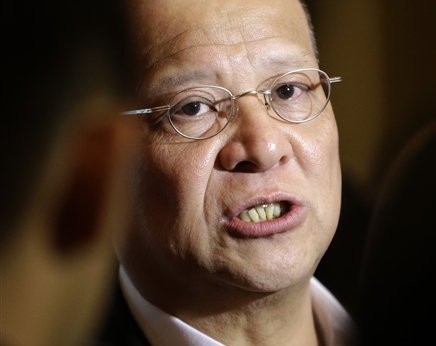A unit of San Miguel Corporation (SMC) has sued Bureau of Customs (BoC) to contest the recent seizure of bunker fuel cargo which the firm said was done without due process and despite being presented with a complete set of import documentation.
The case was filed by SL Harbor Bulk Terminal Corp. — the conglomerate’s fuel import handling company — before the Court of Tax Appeals (CTA) seeking to nullify the decision of forfeiture issued by the customs collector of the Port of Limay, Bataan.
“[Customs] cannot just seize products without following the due process of law at the expense of law abiding taxpayers. They should go after the real criminals,” San Miguel president Ramon Ang said during a press briefing late Friday. “We have always stood behind the BoC in its efforts to put a lid on fuel smuggling and improve its revenue generation, but it has to be done properly.”
Several weeks ago, Customs personnel — armed with a warrant of seizure and detention (WSD) — seized 44,000 metric tons of bunker fuel cargo, consigned to SL Harbor and loaded on M/T Alpine Magnolia and local barge M/T Malolos in Limay, Bataan.
READ: Misdeclared fuel oil shipment seized in Bataan
SL Harbor said the alleged inconsistency arose from BoC’s incorrect assumption of the volume being unloaded from M/T Magnolia into the terminal tanks and the volume being loaded from SL Harbor’s existing tax-paid inventory into M/T Malolos barge. The company said BoC failed to take into account that SL Harbor’s storage tank had existing fuel stock inventory of 6,000 MT at the time of loading.
“There was, therefore, no smuggling, no illegal discharge and no basis for [the seizure],” Ang said. “BoC should focus its efforts on gasoline and diesel smuggling which is becoming more rampant.”
In its petition, SL Harbor explained that industrial fuel oil, more commonly known as bunker fuel oil, is a low value item which can only be used by power plants, seafaring vessels and other manufacturing plants. There are also environmental risks associated with bunker fuel’s transportation and handling.
“[It] is not an activity that anyone would engage in unless it was absolutely necessary,” the firm said in its complaint.
“If one were to smuggle bunker fuel, the conspiracy required would be too complex,” the company said. “SL Harbor would have to conspire with a big trader like Glencore who would then risk $150 billion business to accommodate a small shipment. On top of this, SL Harbor would have to conspire with ship owners who would then expose their entire fleet to risks of seizure. The risks and costs of smuggling bunker fuel far outweigh the taxes to be paid which incidentally was already deposited in an accredited bank, ready to be debited in favor of the BoC.”
Ang pointed out that, as early as April 2013, he had already sounded the alarm about fuel smuggling, urging authorities to clamp down on the trade and saying that as much as one out of every three liters of petroleum sold in locally were smuggled into the market. This causes the government to lose as much as P40 billion annually.
The San Miguel chief also pointed out that, as the country’s largest conglomerate, it paid the government a total of P125.7 billion in various taxes including value added, excise taxes and specific/ad valorem taxes. Over the last five years, the company paid a total of P537.5 billion in various taxes to government.
